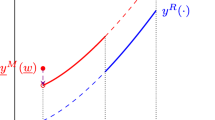Abstract
Textbook analysis tells us that in a competitive labor market, the introduction of a minimum wage above the competitive equilibrium wage will cause unemployment. This paper makes three contributions to the basic theory of the minimum wage. First, we analyze the effects of a higher minimum wage in terms of poverty rather than in terms of unemployment. Second, we extend the standard textbook model to allow for income-sharing between employed and unemployed persons in society. Third, we extend the basic model to deal with income sharing within families. We find that there are situations in which a higher minimum wage raises poverty, others where it reduces poverty, and yet others in which poverty is unchanged. We characterize precisely how the poverty effect depends on four parameters: the degree of poverty aversion, the elasticity of labor demand, the ratio of the minimum wage to the poverty line, and the extent of income-sharing. Thus, shifting the perspective from unemployment to poverty leads to a considerable enrichment of the theory of the minimum wage.
Similar content being viewed by others
References
Adams, S., Neumark, D.: The effects of living wage laws: Evidence from failed and derailed living wage campaigns. J. Urban Econ. 58(2), 177–202 (2005)
Brown, C.: Minimum wages, employment, and the distribution of income. In: Ashenfelter, O., Card, D. (eds.) Handbook of Labor Economics. Amsterdam, North Holland (1999)
Burkhauser, R.V., Couch, K.A., Wittenburg, D.C.: Who gets what from minimum wage hikes: a re-estimation of Card and Krueger’s distributional analysis. Ind. Labor Relat. Rev. 52(3), 547–552 (1996)
Card, D., Krueger, A.B.: Myth and Measurement: The New Economics of the Minimum Wage. Princeton University Press, Princeton, NJ (1995)
Card, D., Krueger, A.B.: Minimum wages and employment: a case study of the fast-food industry in New Jersey and Pennsylvania: reply. Am. Econ. Rev. 90(5), 1397–1420 (2000)
Ehrenberg, R.G., Smith, R.S.: Modern Labor Economics, 9th edition. Addison Wesley, Boston (2006)
Fields, G.S.: Wage floors and unemployment: a two-sector analysis. Labour Econ. 4(1), 85–91 (1997)
Foster, J., Greer, J., Thorbecke, E.: A class of decomposable poverty measures. Econometrica 52(3), 761–776 (1984)
Freeman, R.: The minimum wage as a redistributive tool. Econ. J. 106, 639–649 (1996)
Gramlich, E.M.: The impact of minimum wages on other wages, employment, and family incomes. Brookings Pap. Econ. Act. 2(76), 409–451 (1976)
Hamermesh, D.: Labor Demand. Princeton University Press, Princeton (1993)
Harris, J.R., Todaro, M.P.: Migration, unemployment, and development: a two sector analysis. Am. Econ. Rev. 60(1), 126–142 (1970)
Klasen, S., Woolard, I.: Surviving unemployment without state support: unemployment and household formation in South Africa. CEFifo Working paper no. 533 (2001)
McLeod, D., Lustig, N.: Minimum wages and poverty in developing countries: some empirical evidence. Brookings discussion papers in economics, no. 125. The Brookings Institution, Washington, DC (1996)
Mincer, J.: Unemployment effects of minimum wage. J. Polit. Econ. 84(4) Part Two, S87–S104 (1976)
Mincer, J.: The economics of wage floors. In: Ehrenberg, R.G. (ed.) Research in Labor Economics, vol. 6. JAI, Greenwich, CT (1984)
Morley, S.: Structural adjustment and the determinants of poverty in Latin America. In: Lustig, N. (ed.) Coping with Austerity: Poverty and Inequality in Latin America. Brookings Institution, Washington, DC (1995)
Neumark, D., Cunningham, W., Siga, L.: The effects of the minimum wage in Brazil on the distribution of family incomes: 1996–2001. J. Dev. Econ. 80(1), 136–159 (2006)
Neumark, D., Wascher, W.: Minimum wages and employment: a case study of the fast-food industry in New Jersey and Pennsylvania: comment. Am. Econ. Rev. 90(5), 1362–1396 (2000)
Neumark, D., Wascher, W.: Do minimum wages fight poverty? Econ. Inq. 40(3), 315–333 (2002)
Author information
Authors and Affiliations
Corresponding author
Rights and permissions
About this article
Cite this article
Fields, G.S., Kanbur, R. Minimum wages and poverty with income-sharing. J Econ Inequal 5, 135–147 (2007). https://doi.org/10.1007/s10888-006-9037-5
Received:
Accepted:
Published:
Issue Date:
DOI: https://doi.org/10.1007/s10888-006-9037-5




